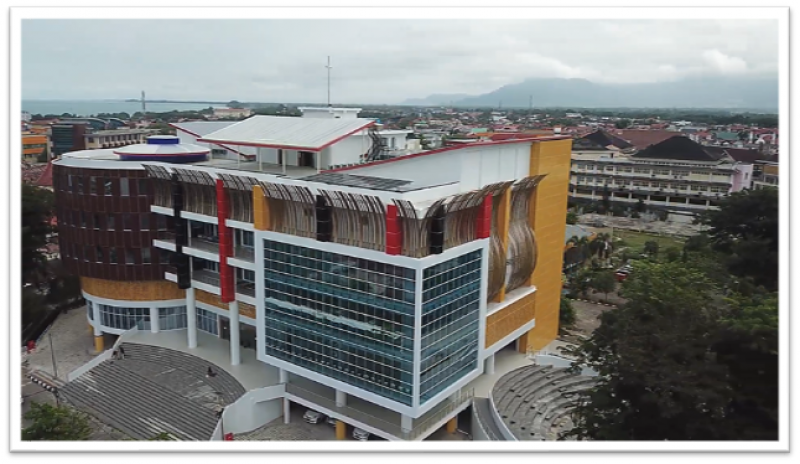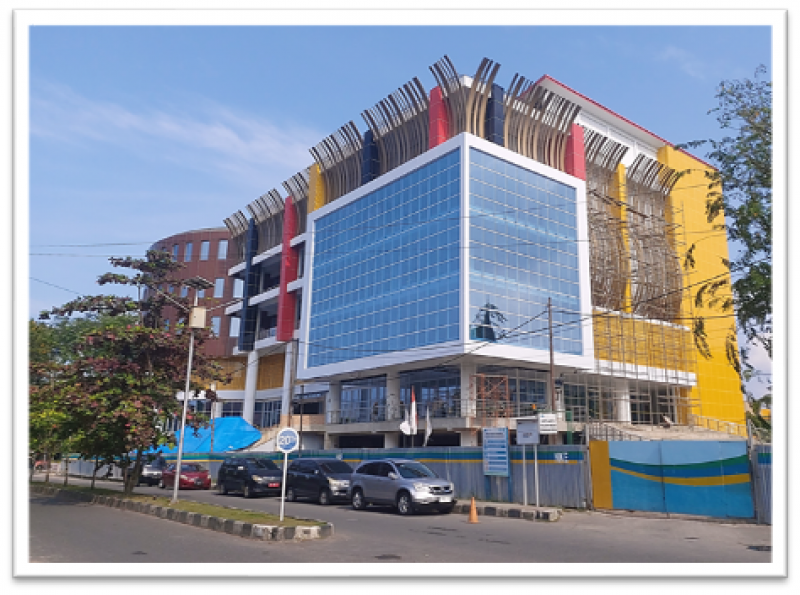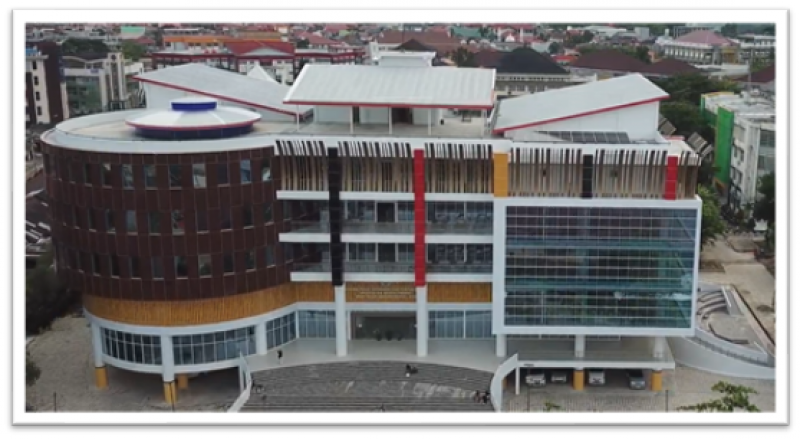


Sejarah Singkat Perpustakaan
Keberadaan Perpustakaan Universitas Negeri Padang (UNP) tidak terlepas dari sejarah perkembangan UNP. Universitas Negeri Padang diawali dengan berdirinya Perguruan Tinggi Pendidikan Guru (PTPG) di Batusangkar berdasarkan Surat Keputusan Menteri Pendidikan dan Kebudayaan Prof. M. Yamin, S.H., pada tanggal 23 Oktober 1954. Pada saat yang sama, Perpustakaan UNP (Perpustakaan PTPG) juga mulai dibangun dengan syarat yang sangat sederhana dengan tujuan untuk melengkapi persyaratan suatu perguruan tinggi. Perpustakaan dibangun dengan koleksi terbatas tanpa adanya tenaga Pustakawan atau yang tidak mempunyai pendidikan formal di bidang perpustakaan.
Dalam perkembangannya, terintegrasinya PTPG ke Universitas Andalas (UNAND) berdasarkan Peraturan Pemerintah Nomor 24 Tahun 1956, dengan nama Fakultas Keguruan dan Ilmu Pendidikan (FKIP) juga turut menyebabkan perubahan pada Perpustakaan PTPG Batusangkar. Pada tanggal 1 September 1956 Perpustakaan PTPG berubah menjadi Perpustakaan FKIP UNAND yang berlokasi di Pondok (China Town). Dengan terintegrasinya seluruh Program B1 yang ada di Provinsi Sumatera Barat (B1 Bahasa Inggris di Bukittinggi, B1 Ilmu Pengetahuan, Tata Niaga, Bahasa Indonesia, dan Pendidikan Jasmani di Padang) ke FKIP UNAND pada tahun 1961, maka Perpustakaan pun semakin berkembang. Pada kurun waktu 1958-1964, Perpustakaan FKIP UNAND menempati ruangan berukuran 8 x 12 meter. Koleksinya terdiri dari 2000 eksemplar buku, dan terdapat tiga orang pustakawan yang bekerja di bawah bimbingan Bapak Ang Le Kwang yang menjabat sebagai kepala Perpustakaan. Masa jabatan Perpustakaan FKIP UNAND berakhir pada tahun 1964 karena adanya perubahan status FKIP UNAND menjadi Institut Keguruan dan Ilmu Pendidikan Jakarta (IKIP Jakarta) cabang Padang.
Berdasarkan Surat Keputusan Menteri PTIP Nomor 162 Tahun 1965, tanggal 30 Agustus 1965, IKIP Jakarta Cabang Padang berubah status menjadi IKIP Padang yang terdiri dari lima fakultas. Seiring dengan perubahan tersebut, Perpustakaan IKIP Padang juga mengalami perkembangan yang signifikan. Dalam kurun waktu 1966 hingga 1971, Perpustakaan menempati ruangan khusus berukuran kurang lebih 200 m2, dengan koleksi sekitar 3000 eksemplar. Pustakawan berjumlah sembilan orang dipimpin oleh Drs. Thamrin Thalaud.
Pada tahun 1971, Perpustakaan IKIP Padang dipindahkan ke gedung permanen 2 lantai yang terletak di Fakultas Ilmu Sosial; lokasi ini berada di sekitar Pusat Komputer saat ini. Dengan luas bangunan sekitar 200 m2, perpustakaan ini memiliki 320 koleksi dengan total 3.600 eksemplar yang dikelola oleh 16 orang staf. Hingga tahun 1973, Perpustakaan masih dipimpin oleh Drs. Thamrin Thalaud yang kemudian digantikan oleh Drs. Barhaya Ali (1974-1975) dan kemudian dilanjutkan oleh Drs. Zainuddin H.R. Lenggang sampai tahun 1993.
Pada masa kepemimpinan Drs. Zainuddin HRL, tepatnya pada tahun 1980, Perpustakaan IKIP Padang menempati gedung baru 2 lantai dengan luas 1.630 m2. Pemanfaatan gedung ini diresmikan oleh Menteri Pendidikan dan Kebudayaan Dr. Daoed Yoesoef pada tanggal 19 Maret 1986. Perpustakaan kemudian juga mendapat tambahan gedung dengan luas 600 m2. Kedua gedung ini kini ditempati oleh Program Pascasarjana dan Program Magister Manajemen.
Pada periode ini Perpustakaan mengalami perkembangan yang sangat pesat baik dari segi koleksi, fasilitas, maupun sumber daya manusianya. Selama periode 1980-1994, koleksi Perpustakaan IKIP Padang mencapai 31.380 judul dengan jumlah 159.848 eksemplar. Koleksi ini tidak hanya terdiri dari buku teks tetapi juga jurnal, majalah, surat kabar, kaset video dan audio, mikrovis, film mikro, dan pesawat televisi dengan parabola. Dari 80 orang tenaga perpustakaan, 32 orang diangkat menjadi pejabat fungsional pustakawan. Sementara ketiganya dibiayai untuk melanjutkan pendidikan pada program Magister (S2) di universitas dalam dan luar negeri, dan ada pula yang mengikuti program pendidikan lanjutan sarjana dan diploma di beberapa universitas di Pulau Jawa. Selain itu, hampir seluruh pustakawan berkesempatan mengikuti pelatihan pustakawan baik tingkat lokal, regional, maupun nasional.
Pada bulan Agustus 1994, Perpustakaan IKIP Padang dipindahkan ke gedung berlantai lima dengan luas 5.000 m3 yang ditempati hingga saat ini. Pemanfaatan gedung ini diresmikan oleh Menteri Pendidikan dan Kebudayaan Dr. Wardiman Djaonegoro pada tanggal 9 Juni 1995.
Saat ini koleksi Perpustakaan IKIP Padang mencapai 33.320 judul dengan jumlah buku teks sekitar 161.068 eksemplar, majalah 150 judul, surat kabar dan tabloid 35 judul, kaset audio 587 judul, kaset video 55 judul, 3 judul judul film dokumenter, 7 judul slide, dan 8039 lembar mikrofis (ERIC-AS). Pada periode ini, Perpustakaan juga mulai mengotomatisasi pengumpulan katalog.
Pada periode 1993-1997, Perpustakaan IKIP Padang dipimpin oleh Drs. Barhaya Ali, MLS yang juga memimpin 82 pustakawan. Saat ini Perpustakaan IKIP Padang mempunyai 3 orang pustakawan yang berkualifikasi magister Ilmu Perpustakaan dan Informasi, 1 orang sarjana ilmu perpustakaan, 2 orang sarjana plus ilmu perpustakaan, dan 6 orang sarjana ijazah ilmu perpustakaan. Ada juga peningkatan signifikan dalam pengumpulan yang meningkat melalui berbagai sumber pendanaan proyek.
Pada periode 1997-1999, Perpustakaan IKIP Padang dipimpin oleh Dra. Gusmar Bahar, pustakawan senior pertama yang dipercaya memimpin Perpustakaan IKIP Padang. Berbagai perubahan terutama penataan internal terus dilakukan, termasuk pembenahan organisasi. Pada periode ini, Perpustakaan juga masih mengirimkan pustakawannya untuk melanjutkan studi ke program diploma (D3), sarjana (S1), dan magister (S2). Penambahan penghimpunan juga terus dilakukan dengan menggunakan berbagai sumber dana.
Seiring dengan berubahnya IKIP Padang menjadi Universitas Negeri Padang, maka Perpustakaan IKIP Padang juga mengalami perubahan nama menjadi Perpustakaan UNP. Pada periode 1999-2002, Perpustakaan dipimpin oleh Dr. Maizuar, M.Pd. Pada saat ini Perpustakaan mengalami peningkatan pemanfaatan teknologi informasi, seperti katalog akses publik online (OPAC) yang dipasang menggunakan jaringan lokal (LAN) dengan delapan terminal yang tersebar dari lantai 1 hingga lantai 5. Selama ini, Perpustakaan juga sudah mulai memanfaatkan internet pada 12 unit komputer untuk pelanggan mahasiswa. Tonggak sejarah lain yang dicapai Perpustakaan adalah peningkatan kerjasama dengan lembaga lain, seperti PDII-LIPI, Perpustakaan Mahaputra Muhammad Yamin, dan lain-lain.
Pada periode 2002-2008, Perpustakaan UNP dipimpin oleh Drs. Yunaldi, M.Si, pustakawan senior yang juga alumni Universitas Indonesia. Prioritas pengembangan pustakawan diarahkan pada berbagai sektor, seperti penataan sistem pengelolaan perpustakaan, penguatan basis teknologi informasi, pengembangan sumber daya manusia, optimalisasi sumber daya keuangan dan peningkatan kesejahteraan pustakawan dalam rangka memasuki era informasi global. Pada masa ini, Perpustakaan mulai mengembangkan Student Service Center (SSC) yang bertempat di lantai dasar. SSC diharapkan mampu melayani berbagai kebutuhan mahasiswa, dosen, dan karyawan.
Selain itu, koleksi Perpustakaan terus ditingkatkan dengan menggunakan berbagai sumber pendanaan seperti, DIP dan DIKS yang diarahkan pada program studi baru. Untuk pengembangan sumber daya, kualitas dan kuantitas terus ditingkatkan dengan mengirimkan pustakawan untuk melakukan pendidikan lanjutan serta mengadakan rekrutmen pustakawan baru yang berlatar belakang pendidikan ilmu perpustakaan dan informasi.
Pada periode 2008-2013, Perpustakaan UNP dipimpin oleh Drs. Sutarman Karim, M.Sc. Saat ini pengembangan Perpustakaan diprioritaskan pada penerapan teknologi informasi di segala lini mulai dari layanan sirkulasi hingga pengelolaan KKI. Pada periode ini, seluruh koleksi civitas akademika berupa Tugas Akhir, Tesis, Disertasi, dan Penelitian diterima dalam bentuk soft copy file. Kualitas sumber daya manusia juga terus ditingkatkan melalui pelatihan, magang, pendidikan lanjutan, dan seminar. Periode 2014-2018 dipimpin oleh Drs. Yunaldi, M.Sc.


